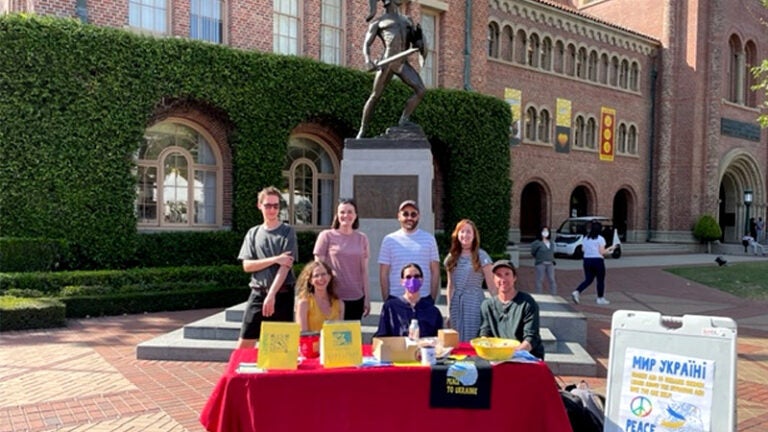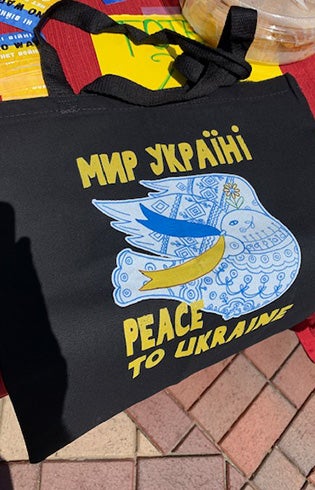
Students raise money for Ukrainians hit by Russia’s invasion
When Russia invaded Ukraine on Feb. 24, the conflict hit close to home for Nikita Allgire — and not just because his studies focus on the region.
Allgire, a Slavic languages and literatures PhD student at the USC Dornsife College of Letters, Arts and Sciences, was born in Rostov-on-Don, Russia, about 100 miles from Mariupol, Ukraine. Allgire’s stepsiblings are Russian-Ukrainian. His uncle is Russian, married a Ukrainian, and now identifies as Ukrainian.
The uncle and his family were in Kyiv when the war began. “They were hesitant to leave. We had to talk my uncle down from taking up arms in the civilian army,” says Allgire. They eventually evacuated as Russians shelled the city, and for nearly a week, Allgire lost contact with them. They eventually made it to safety in Lviv.
Allgire’s experience illustrates the complicated nature of this conflict. “My personal family history shows how deeply intertwined Ukrainian and Russian civilian lives are and how difficult it is, though perhaps politically necessary, to differentiate them in an absolute sense,” he says.
Human impact
Allgire is one of a number of Slavic studies students at USC Dornsife who have found their academic focus, and personal life, disrupted by the war. Slavic studies encompasses all of the countries in which Slavic languages are spoken, including Russia and Ukraine.
“This seems to happen historically in this field, some conflict erupts and suddenly people want to know about Slavic studies,” says Allgire. “It makes our field immediately relevant, which is good, but for very bad reasons.”
PhD student Erica Camisa Morale, who is from Italy and researches early modern East Slavic culture, is carefully watching how involved Europe might get in the conflict and how far the fighting will extend. Her friends and family back in Italy are also hosting Ukrainian immigrants.
“They’re experiencing difficulties in communicating because of the language barrier, but at the same time, month after month, they’re building a bond,” she says.
Many students have friends in both Russia and Ukraine, like Caitlin Giustiniano, a PhD student who studies Russian absurdist prose. “It’s tough to see your friends worry about their family and about the well-being of their country,” she says.”
The war is also preventing students from conducting research abroad, in archives and at historical sites, which slows work toward their PhDs.
Scholars helping scholars

USC Dornsife graduate student Joseph Nakpil designed a special graphic for tote bags and mugs sold at the fundraiser. (Photo: Courtesy of Erica Camisa Morale.)
The students, part of the campus group Organization of Students in Slavic and East European Studies, are finding ways to bring assistance to Ukraine. They started with a fundraiser, in collaboration with the International Task Force for Displaced Scholars, selling tote bags and mugs with a design by PhD student Joseph Nakpil.
The response across campus was enthusiastic, with many donating outright rather than taking a bag or mug, said Camisa Morale. The group quickly raised nearly $2,000 for Help US Help, which provides supplies to volunteer Ukrainian medical units.
They’re aiming to launch a lecture series this fall, inviting Ukrainian scholars and Russian scholars who have opposed the war to speak over Zoom in exchange for a small stipend.
Another goal is to help displaced Ukrainian and Russian academics find placement at universities, possibly at USC. They’ve been spreading the word about programs like Scholars at Risk, the Institute of International Education and the Scholar Rescue Fund.
Advocating strongly for peace, they argue for immediate de-escalation and peace talks rather than a long, drawn-out conflict. “We want the sovereignty of Ukraine respected and upheld, but our message is one of peace,” says Allgire.
Culture wars
They’re also grappling with the public’s reaction to Russia’s invasion, which has sometimes veered toward being discriminatory. A Montreal symphony canceled their engagement with the Russian pianist Alexander Malofee. The European Film Awards banned Russia from competition and encouraged a boycott of Russian films.
These sorts of exclusions overlook the many Russians who are strongly opposed to the war, and who face imprisonment if they speak out. “We are against any type of discrimination against any type of culture’,” says Camisa Morale.
Exclusions also fail to separate Russia’s rich cultural history from Russian president Vladimir Putin’s current reign.
“It’s important to separate Russia itself from ‘Putin’s Russia,‘ which uses the culture to promote its own state power. Russian literature and art are bigger than state power,” says Giustiniano.
The conflict poses an opportunity to teach about the cultural overlap between Russia and Ukraine. Take the celebrated writer Nikolai Gogol, for instance. He’s renowned in Russia, earning a state-issued stamp, and was hugely influential to Russian writers like Fyodor Dostoevsky and Mikhail Bulgakov.
Yet, Gogol was actually born and raised in what is now Ukraine, which also claims Gogol as a native son. His Evenings on a Farm near Dikanka feature his impressions of peasant life and culture, based on his early life spent in the Ukrainian village of Velyki Sorochyntsi.
Teaching his writing can show how national identity often blurs in the region, and how deeply interconnected these countries are, which makes the fighting that much more devastating.